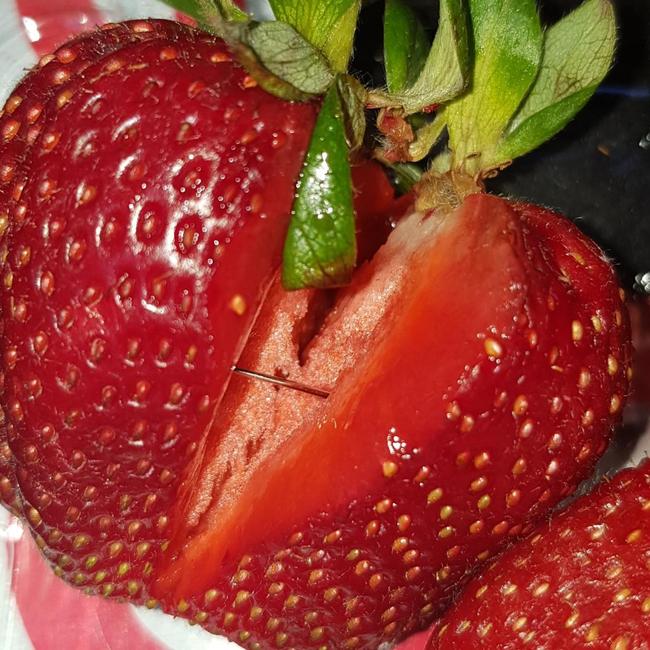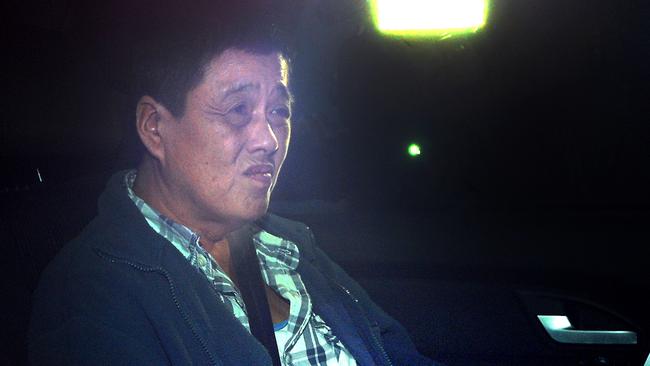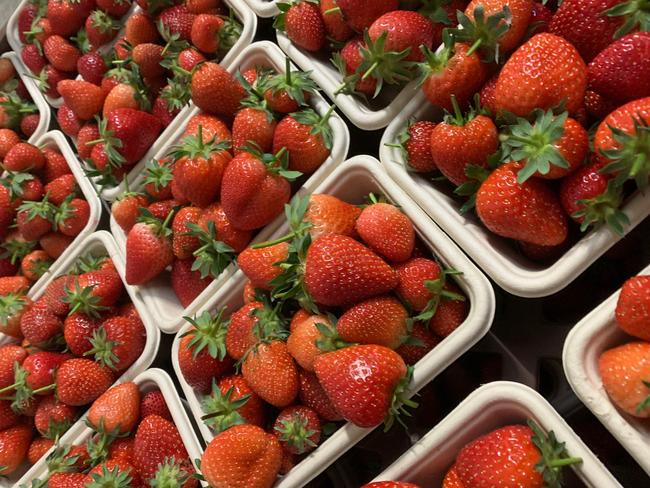Strawberry needle case: Culprit in $12m crime may never be found
It is possible no one will ever be punished for the strawberry sabotage that paralysed a nation and devastated an industry.
QLD News
Don't miss out on the headlines from QLD News. Followed categories will be added to My News.
It was the crime that gripped the country and brought an entire industry to its knees.
A tiny sewing needle found lodged inside a strawberry purchased at a Queensland supermarket in September 2018 sparked a devastating chain reaction that no one could ever have predicted.
Entire crops were dumped and left to rot in the sun, hundreds of copycat saboteurs and hoaxes ensued, legislation was overhauled to introduce tougher penalties, an unprecedented countrywide police investigation was launched, and the government was forced to roll out millions of dollars in relief packages to help rescue the decimated industry.
But despite the devastating consequences, it’s possible no one will ever be punished for the crime after prosecutors this week dropped the case against the woman they had accused, conceding they did not have enough evidence to convict her.
In November 2018, two months after the first needles were discovered, police arrested and charged Sunshine Coast strawberry farm worker My Ut Trinh, now 53, with eight counts of contamination of goods with intent to cause economic loss.
Trinh was a supervisor at the Berrylicious and Berry Obsession farm at Wamuran on the Sunshine Coast, and police claimed she had been motivated to sabotage the fruit out of spite after an argument with her employer Kevin Tran.
It’s been a living nightmare for Vietnamese refugee Ms Trinh who has faced intense public scrutiny since her arrest.

A prosecutor at her bail application even warned police feared for her safety because it was likely she could be the victim of retribution attacks.
Ms Trinh has not been able to visit her elderly 96-year-old mother in Vietnam for almost three years after she was forced to surrender her passport as part of her strict bail conditions.
She has also not been able to see her own grandchildren.
When asked by reporters on Wednesday how she was feeling about the charges being dropped, Trinh, who speaks very little English quietly told media “yeah really good thank you”.
She was surrounded by supporters including Mark Ellis who said the charges had been a “joke from the start” and had prevented Ms Trinh from living with her partner and from earning an income.
“She’s been scared to go anywhere or do anything,” he said.
Concerns about the strength of the police case against Ms Trinh had been raised as early as her bail application in the Brisbane Magistrates Court in 2018 but the case proceeded through the courts right up until the eleventh-hour backflip by prosecutors moments before her trial was due to begin on Wednesday.
In response to questions about the unexpected withdrawal, a spokesman for the Director of Public Prosecutions told The Courier-Mail: “Following legal argument over the past two days on evidential matters, a determination was made this morning that the Crown no longer had a reasonable prospect of securing a conviction in this matter and it was discontinued.”
At the time of her arrest, detectives said they had worked tirelessly on the “unprecedented” investigation that impacted virtually every state and jurisdiction in the country with a top investigator describing the police case against Ms Trinh as “strong”.

A Queensland police spokesman did not respond to questions from The Courier-Mail about whether officers expected further charges to be laid or if there were any persons of interest.
“The case will remain an open investigation,” the spokesman said.
“Anyone with new information is encouraged to contact Crime Stoppers.
“The QPS acknowledges the decision by the Director of Public Prosecutions (DPP) to withdraw these charges. The Office of the Director of Public Prosecutions (ODPP) is an independent statutory office.”
The crisis began in September 2018 when a man was rushed to a Sunshine Coast hospital after swallowing a needle while eating a strawberry purchased at a southeast Queensland Woolworths.
Police believed seven other punnets of berries sold across Victoria and Queensland in the days that followed were linked to that case but by then, the crime was being mimicked across the country and fuelled by a rampant social media wildfire.
The initial incident sparked a wave of copycat cases and hoaxes with a further 231 reports of fruit contamination reported, impacting 68 brands across Australia with 49 based in Queensland.
Of those, 186 incidents involved needles placed in strawberries.
In Queensland there were 77 incidents of sabotage but 15 of those were hoaxes or false reports.
Supermarkets stripped the fruit from their shelves and devastated farmers were forced to dump tonnes of the fruit which was left to rot in the sun.

Industry experts estimate that at least $12 million was wiped from the predicted value of the strawberry crop for the 2018-19 season following the incident, with some brands losing up to $2.5 million each.
Berries Australia executive director Rachel Mackenzie this week said there was “widespread disappointment” in the strawberry industry that the crime remained unsolved.
“It did have an enormous impact both financial but also psychological as well,” she said.
“It was a very challenging time for the growers so the lack of closure on this is obviously challenging.”
Ms Mackenzie said the psychological toll the strawberry crisis had on farmers could not be understated.
The spate of cases caused the government to enact the Criminal Code Amendment Food Contamination Bill, making the intentional reckless contamination of goods an offence against the Commonwealth and increasing the maximum penalty to 15 years imprisonment.
The state and federal governments each announced $1 million relief packages to assist with the disaster, vowing to help farmers, investigate gaps in the supply chain and promote strawberries.
The crisis sparked a massive outpouring from the Queensland community who rallied to purchase strawberries to support farmers with the catch cry ‘cut them up, don’t cut them out’.
In 2019, Food Standards Australia New Zealand (FSANZ) released a report on the crisis and made a series of recommendations including calls for improved communication during similar incidents.

The report called for increased traceability measures within the horticulture sector and recommended police be included in national food incident debriefs.
It also recommended a central agency be engaged to help co-ordinate communications in any future cases given the widespread misinformation during the crisis.
Queensland produces more than 40 per cent of the country’s strawberries and Ms Mackenzie said farmers had worked hard to move on from the incident but had been hampered by the coronavirus since last year which had caused a severe worker shortfall.
The shortage of workers has prompted the Queensland Strawberry Growers Association to launch a promotion in which workers in the industry have the chance to win a $100,000 prize at the end of the season.
Ms Mackenzie said the promotion was designed to attract workers to the industry which ordinarily relies heavily on backpackers.
She said a silver lining of the sabotage crisis was that the strawberry industry was well prepared for the pandemic due to their efforts to build industry resilience, strengthen supply chains and increase education around crisis management.
“We have certainly grown in terms of our maturity as an industry,” she said.
Despite the astronomical economic and psychological toll of the contamination crisis, it remains unclear whether one of Queensland’s most notorious crimes will ever be solved.
Anyone with information is urged to phone Crime Stoppers on 1800 333 000.
Originally published as Strawberry needle case: Culprit in $12m crime may never be found




